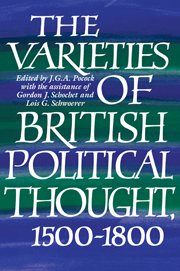Book contents
- Frontmatter
- Contents
- Acknowledgements
- Editorial introduction
- Part I Church, court and counsel
- Part II Dissolution, restoration and revolution
- Part III Commerce, empire and history
- 7 Politics and politeness in the reigns of Anne and the early Hanoverians
- 8 Political thought in the English-speaking Atlantic, 1760–1790: (i) The imperial crisis
- 9 Political thought in the English-speaking Atlantic, 1760–1790: (ii) Empire, revolution and an end of early modernity
- Epilogue
- Index
8 - Political thought in the English-speaking Atlantic, 1760–1790: (i) The imperial crisis
Published online by Cambridge University Press: 04 August 2010
- Frontmatter
- Contents
- Acknowledgements
- Editorial introduction
- Part I Church, court and counsel
- Part II Dissolution, restoration and revolution
- Part III Commerce, empire and history
- 7 Politics and politeness in the reigns of Anne and the early Hanoverians
- 8 Political thought in the English-speaking Atlantic, 1760–1790: (i) The imperial crisis
- 9 Political thought in the English-speaking Atlantic, 1760–1790: (ii) Empire, revolution and an end of early modernity
- Epilogue
- Index
Summary
The sixteenth and seventeenth centuries are conveniently divisible at critical events near the end of the sixth decade of each: the accession of Elizabeth I in 1558, the restoration of Charles II in 1660. To divide the eighteenth century at 1760, the date of George Ill's accession, risks seeming to perpetuate ancient myths about a new departure in politics occasioned by that king's policies and personality. These myths are long exploded. Nevertheless, Britain was still a personal monarchy – it can be argued that George III was the last great personal monarch in its history – and in the history of its discourse it is in fact possible to find some new departures, taking their rise from actions the new king took, or was said to have taken, soon after his accession. The myth of George III is a fact of this kind of history, even if it presents as facts events and intentions which must be dismissed as myths from history of another kind, and this proposition has implications for the writing of history in general. There is therefore a case for commencing a chapter from the year 1760; but it is necessary to go further back in search of events and processes in political history and the history of political literature which gave what began to happen soon after that year its character.
The failure of Prince Charles Edward's attempt on the throne in 1745-46 can be seen in hindsight as the end of the Jacobite threat which since 1689 had done much to destabilize British politics by keeping alive the knowledge that there existed a dynastic alternative.
- Type
- Chapter
- Information
- The Varieties of British Political Thought, 1500–1800 , pp. 246 - 282Publisher: Cambridge University PressPrint publication year: 1994
- 4
- Cited by



